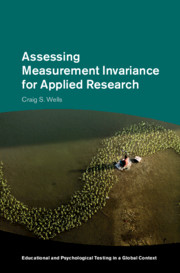Book contents
- Assessing Measurement Invariance for Applied Research
- Educational and Psychological Testing in a Global Context
- Assessing Measurement Invariance for Applied Research
- Copyright page
- Dedication
- Contents
- Figures
- Tables
- Preface
- Chapter 1 Introduction
- Chapter 2 Observed-Score Methods
- Chapter 3 Item Response Theory
- Chapter 4 Methods Based on Item Response Theory
- Chapter 5 Confirmatory Factor Analysis
- Chapter 6 Methods Based on Confirmatory Factor Analysis
- Appendix A A Brief R Tutorial
- References
- Author Index
- Subject Index
Chapter 3 - Item Response Theory
Published online by Cambridge University Press: 13 May 2021
- Assessing Measurement Invariance for Applied Research
- Educational and Psychological Testing in a Global Context
- Assessing Measurement Invariance for Applied Research
- Copyright page
- Dedication
- Contents
- Figures
- Tables
- Preface
- Chapter 1 Introduction
- Chapter 2 Observed-Score Methods
- Chapter 3 Item Response Theory
- Chapter 4 Methods Based on Item Response Theory
- Chapter 5 Confirmatory Factor Analysis
- Chapter 6 Methods Based on Confirmatory Factor Analysis
- Appendix A A Brief R Tutorial
- References
- Author Index
- Subject Index
Summary
IRT is a powerful scaling technique that provides a collection of latent variable models that describe performance at the item level relative to an examinee’s latent variable. IRT models have several attractive features that make them appealing for test developers and researchers to use to construct educational and psychological tests (Lord, 1980). The models can be applied to educational achievement tests such as TIMSS, as well as to psychological latent variables such as depression or anxiety measures. IRT is the driving force for the development and widespread use of computerized adaptive testing. The purpose of this chapter is to introduce IRT and its fundamental principles and applications so that the reader who is unfamiliar with IRT will have sufficient knowledge to apply the IRT DIF methods described in Chapter 4.
- Type
- Chapter
- Information
- Assessing Measurement Invariance for Applied Research , pp. 108 - 160Publisher: Cambridge University PressPrint publication year: 2021



